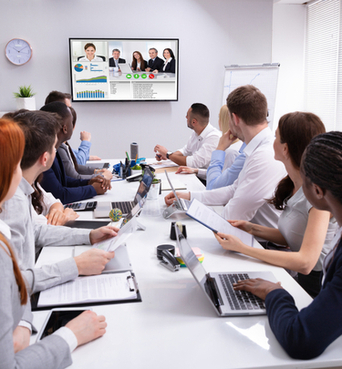June 23, 2021
Client collaboration, law firm culture and the war for talent, technology, and Brexit headlined Sandpiper Partners’ ninth annual London Legal Market Virtual Conference. Williams Lea’s CEO, Clare Hart, joined a panel discussion on maintaining a consistent culture in the new ‘next’ normal where the overall sentiment from law firm leaders confirmed that the office of the future will be built around a hybrid in-office and remote working model.
Here are the top three takeaways from the event:
Law firms need to continue focus on DE&I and mental health issues even when market conditions shift downward
There has been a lot of talk and action among law firm leaders on issues relating to maintaining a strong culture and identity, promoting diversity, equity and inclusion, and helping law firm employees deal with mental health and work-life balance. Much has been achieved to address these issues in the past year, but panelists were unanimous in agreeing that this needs to continue, even during a fiscal downturn. As one of the panelists who leads a top-tier international law firm pointed out, “Are we going to be sufficiently prepared and continue to be focused on diversity issues, on the health issues, on the work life balance issues, all the lessons we’ve learned through COVID, when the rubber hits the road? Most law firms are doing great. Hopefully all of the firms involved in this event are preparing for the next economic issue that we’re going to have to deal with. How are we going to remember these important societal issues that we’re dealing with now when things are good?”
The way law firms treat their employees can help them engage with and guide clients
Law firms and their clients have both been going through the same issues with onboarding associates and new joiners during the pandemic. A law firm client and general counsel at a leading international investment bank stressed the need for greater collaboration between law firms and their clients to ‘demystify’ the issue: “(Law firms) should be dictating how we all function and relate with each other going forward, particularly as we’re trying to figure out what does hybrid mean and what does returning to office actually mean? How do we keep people motivated and engaged? Clients are actually looking to law firms to try and demystify that so I encourage law firms to be bold. The way that you treat your employees is also a reflection of how you’re going to engage your clients. So, if you’re able to figure out how to get the most out of your employees in this hybrid environment, then you should also be advising on that to your clients because your clients aren’t going to know the answer.”
A panelist and managing partner at an international law firm agreed with the need to continue managing employee stress, but emphasized that there have been some good outcomes: “There’s been a real push by clients for efficiency and predictability, and I think we as law firms have delivered. This lockdown period, particularly the initial one, gave us a lot of opportunities to think through how are we going to change and I think there is a greater willingness, I would say, than there was before to actually listen to what the clients want and stop presuming what the clients want.”
Community managers combined with efficient workflow tools can help young associates mitigate overworking and look forward to returning to the office
As the topic of hybrid working dominated the event, there was the question on apprenticeship and the relationship between law firm partners and associates as we return to the office. Clare Hart raised the concept of bringing in community managers who could act as workplace ambassadors in the office to help employees create a social connection. Clare said, “We’re seeing clients looking at how we create opportunities for people to come together in the office to meet with clients and colleagues. In consultancy firms we’ve seen the community managers responsible for organizing breakfasts and lunch meetings or hold speaker events. They play into making associates and attorneys feel connected to the firm.”
Clare also stressed the need for law firms to put greater effort for harnessing the data they have by implementing client platforms that act as a data warehouse, workflow tool and reporting dashboard to help offload administrative work from young associates and partners, regardless of where they are working. As Clare said, “We have firms asking us if they can use ENGAGE, our workflow tool, as an organizer for their own employees who are working from home and as a reporting tool for employee utilization rates and number of jobs by person and by matter. Law firms can see turnaround times, accuracy, and user feedback because they’re the best surveys. What we’re finding is much more acceptance and embracing of outsourcing because of the benefit it brings and the utilization of technology to better manage the resources.”
To find out more about hybrid working affecting business sectors including legal, download Hybrid working: A future of work brief, which explores the challenges and opportunities of this agile work model.
Share
How we help
-
Rightsize real estate or office space
Freeing up valuable corporate office space for strategic business activities
-
Connect virtual and onsite teams
Enabling a hybrid workforce through rightshore support models
-
Improve team productivity
Boosting productivity using workflows and performance analytics












